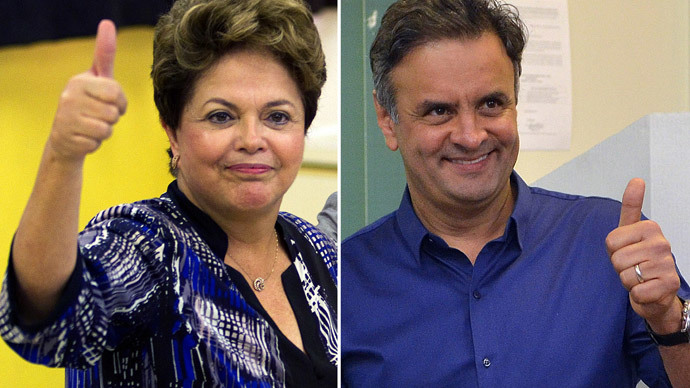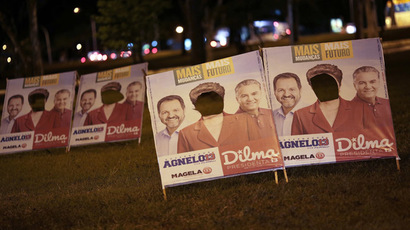Rich-poor divide dominates Brazil’s tight presidential election run-off

Brazilian voters are heading to the polls to choose the country’s president in a tight presidential run-off with voters divided along class lines as income inequality remains a critical problem.
A pre-election poll by Ibope agency demonstrates that 66-year-old leftist incumbent president Dilma Rousseff should attract 49 percent of the prospective total vote, while the second candidate, 54-year-old pro-business Aecio Neves, is predicted to garner 43 percent.
Another poll by Datafolha also showcased the Rousseff’s lead: 47 percent compared with 43 percent for Neves.
Finally, a third poll published on Saturday by MDA, a lesser-known agency, gave Neves 50.3 percent of votes to 49.7 percent for Rousseff.
All in all, experts agree that Rousseff has a close edge over Neves, but the result might still be a surprise due to the polarized attitudes in the Brazilian community.
“The election is open because there is still a latent desire for change,” Rafael Cortez, political scientist at São Paulo-based consulting firm Tendências Consultoria, told the Wall Street Journal.
"The country is divided in two, with half feeling that social inclusion and protections are what matter most, and the other half believing that macroeconomic stability is more important," Carlos Pereira, a political analyst at the Gertulio Vargas Foundation, Brazil's leading think tank, said to AP.
In the current election, Rousseff has the poor’s support: after a dozen years of her party being in power, 40 million people have been lifted from the brink of poverty due to social reforms and economic boom which country experienced until Rouseff came to power. The growth during her four-year rule is the lowest for any Brazil president since the early 1990s, The Financial Times reports.
Ibope agency, when carrying out the latest survey, spoke with over 3,000 voters across Brazil.
"I'm voting for Dilma because the Workers' Party has made life easier for the poor. I still live in a slum, but now my home is full of nice, modern things — I've got a TV, a new refrigerator and air conditioning," Ana Paula Marinho, a nurse who lives in the Pavao-Pavaozinho favela, said.
"We can see that we've got a better future with Dilma," she added.

However, centrist Neves is supported by the upper-middle class and the rich, promising the economic growth and to deal with high inflation for the country that has been in decline for four years.
Patricia Botelha, who lives in Rio's wealthy Ipanema neighborhood, said Rousseff's poor management resulted in Brazil's economic recession - and all Brazilians will pay the price if the country doesn't rebound soon.
"We've never seen social advances among the poor as we've witnessed during the last 12 years. Those are real accomplishments and we're all better off for it. But we need new ideas on the economy, on how to keep growing, or those gains will be reversed no matter what policies are enacted," Botelha told Ibope.
The presidential race got a surprising turn in August, when the main opposition candidate Eduardo Campos was killed in a plane crash on the campaign trail.
The first round of the election took place on October 5, making it necessary to conduct the run-off when Rousseff came in first but failed to gather more than 50 percent of the vote.
Candidates’ blame game: Ghosts of past v monsters of present
In the final TV debate on Friday, Rousseff and Neves clashed over the ongoing bribery scandal at the Brazil’s largest company, oil giant Petroleo Brasileiro SA.

Neves asked Rousseff if she was informed about a scam that reportedly got a pay-off from Petrobras oil company contractors, with the funds given to Rousseff’s Workers’ Party – allegations Rousseff dismissed.
Rousseff emphasized the expansion of social benefits and the increase in salaries, urging the public to remember “the ghosts of the past”: when Neves’s party was in power, the majority of the nation suffered in poverty and unemployment. Neves, however, argued that one should be more afraid of “monsters of the present”: inflation, economic recession, and corruption, vowing he would keep the social programs as well.
The incumbent president blamed the Brazilian Social Democracy Party for the crisis with water in Sao Paulo: the country’s largest city is running low on water, and Rousseff stated that the state government run by Neves’s party was responsible for it.
"Such a lack of planning in the richest state in the country is shameful," she said, as quoted by Reuters.














